教会中的问题 Problems in the Church
Acts 18:1–17
Remember these points
I put these points at the top of my sermon-prep template to remind myself every week:
- Show that main point of passage relates to Jesus and his saving work
- (1 Cor 1:18) A truly gospel-centred message will not be acceptable in a synagogue or mosque
- Did I proclaim the gospel as the headline news of the sermon, rather than as a “by the way…”?
- Unbelievers are called to repent, believe, and be saved
- Believers are encouraged to abandon their old self, renew their minds, put on the new self in Christ
- Preach simple sermons, so that God’s people can see Christ more clearly and love him more dearly
News
Continue to pray for the church, for people who are ill, etc.
Continue to read the Bible daily.
Hook

Do you think these problems can happen in today’s churches?
- Conflict within the church
- Individualism, pride
- Incest, loose morals, prostitution, adulter
- Confusion between the role of men and women in the church
- Using the church to raise your social status
- Disturbance during worship
- No love towards brothers and sisters
- Not believing in bodily resurrection

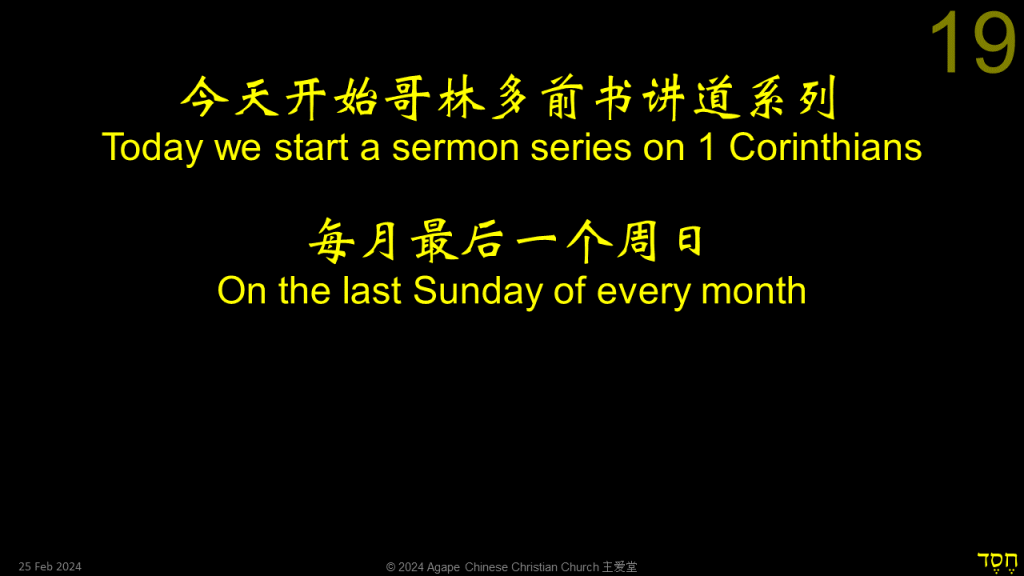

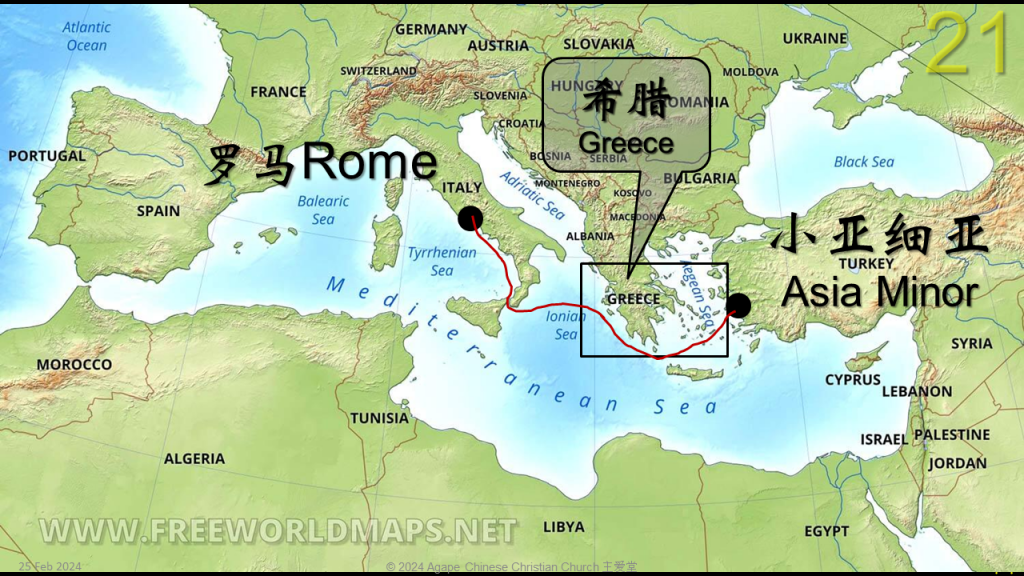
If you were to travel from Rome to Ephesus (or vice versa), what’s the route you’d take?
Sailing from Rome to Ephesus along the red-route is the most direct.
You hug the coast as much as you can, to avoid rough seas in the Mediterranean.
But it’s a long and dangerous journey, especially the part around the bottom of Greece.
Many sailors died on such trips.
What if there’s a safer and shorter way?

The black-route goes through the middle of Greece, up to the point where water ends.
But just 6Km further, on land, we come to the other side where there’s water again.
The black route is sheltered on both sides by land, and is faster than the red-route by 6 days.
But you do have to go through 6Km of land before you can sail again.
There’s a city that controls the ports on both sides of this tiny strip of land, guess which city?
Corinth!
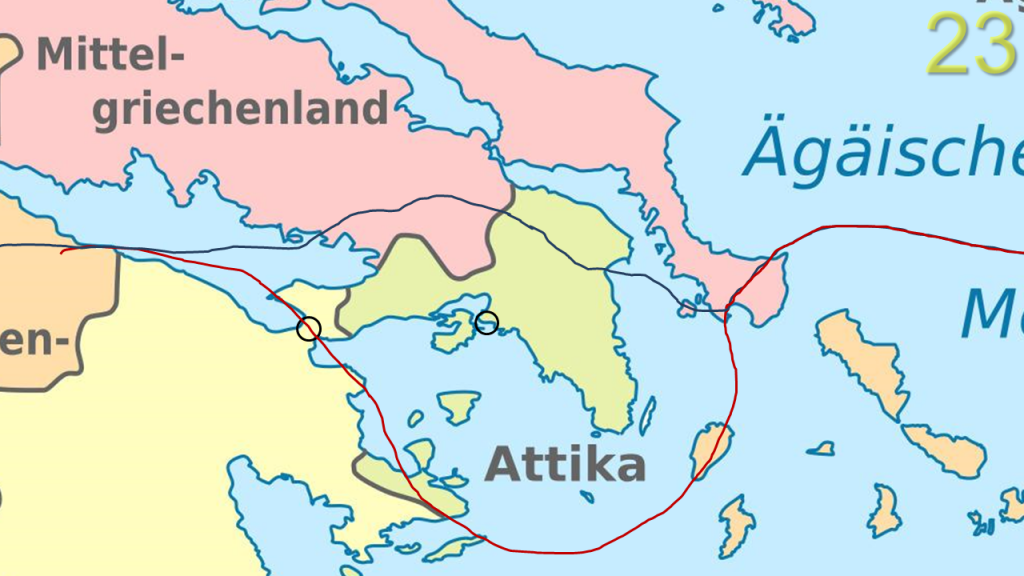
A more detailed look.
The 2 harbours, one towards the north (top), the other towards the south, both separated by about 6Km.
They built a road between the 2 harbours to transport goods (and even ships) from one to the other.
The next pic shows part of this road (over 2,000 years old, no longer used, of course).
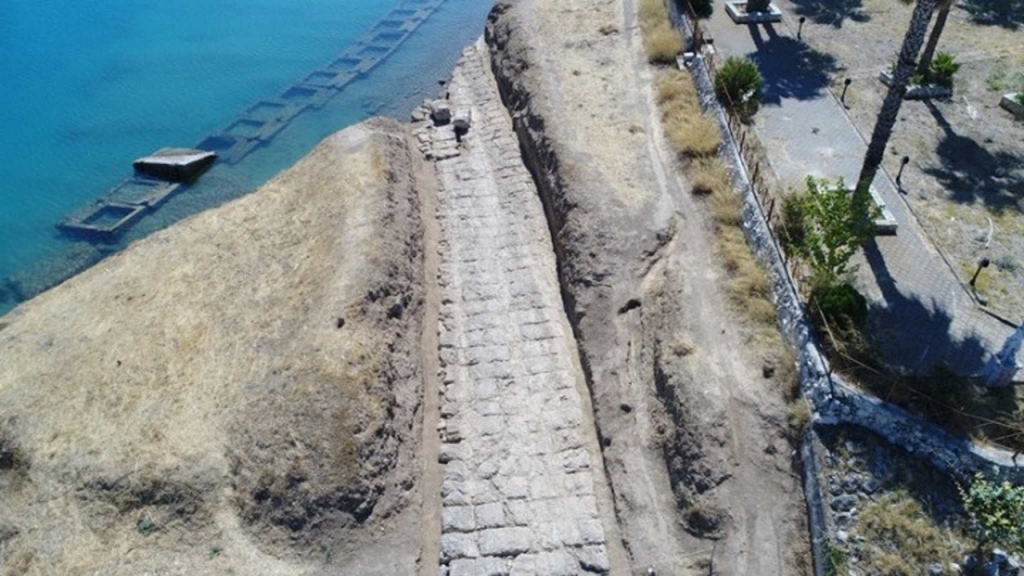
Being at the crossroads (north-south, as well as east-west) made Corinth a very desirable and prosperous city.
Corinth is full of travelers and tradesmen, all sorts of goods flow in all directions.
Next month, we’ll look at more details about Corinth.
Passage

This is the modern Corinth Canal, where large ships can sail from one side to the other.
Chinese Passage (English text below)



English Passage

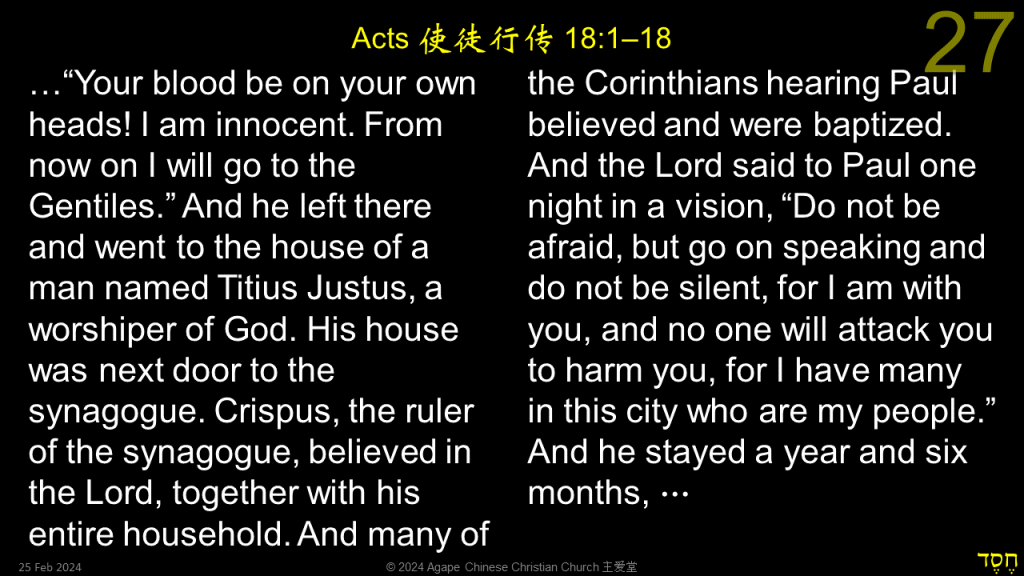

Outline

Today’s outline is very simple.
We look at what Acts 18 tells us about Corinth.
Then we compare two churches, both established by Paul, and see what we learn from them.
Section 1

Claudius is Roman emperor from ~41–53 AD.
Aquila and Priscilla, both apparently believers, tent-makers like Paul.
Expelled from Rome by Claudius, along with all the Jews in Rome.
This couple is only mentioned in Acts 18, and after the initial introduction, it’s always Priscilla’s name before her husband’s name, most likely because she’s more prominent in the church than her husband.
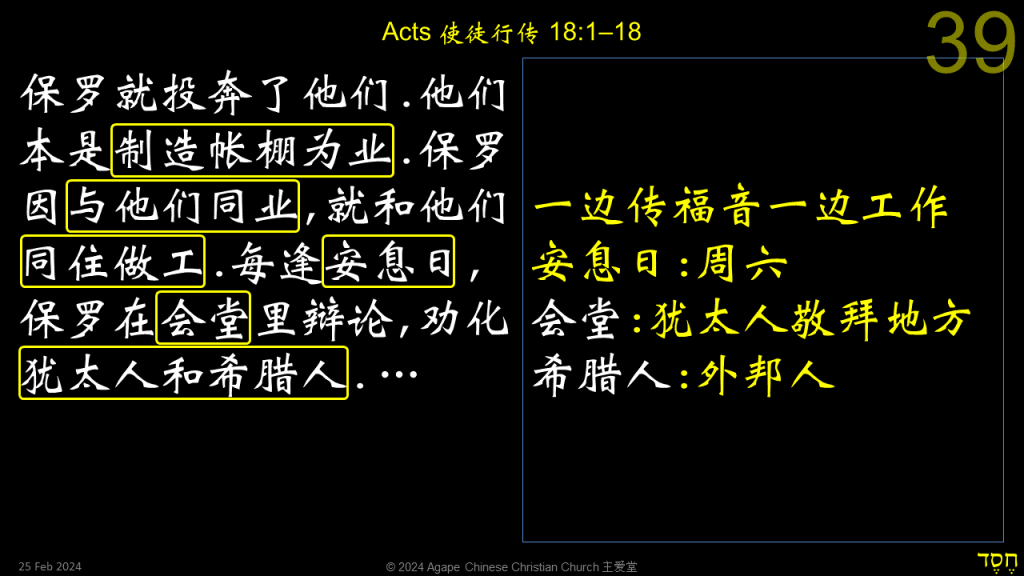
Paul works while he preaches the gospel.
Sabbath is always Saturday. We worship on Sundays, so that’s a day of rest for us.
But the term “Sabbath” always mean Saturday.
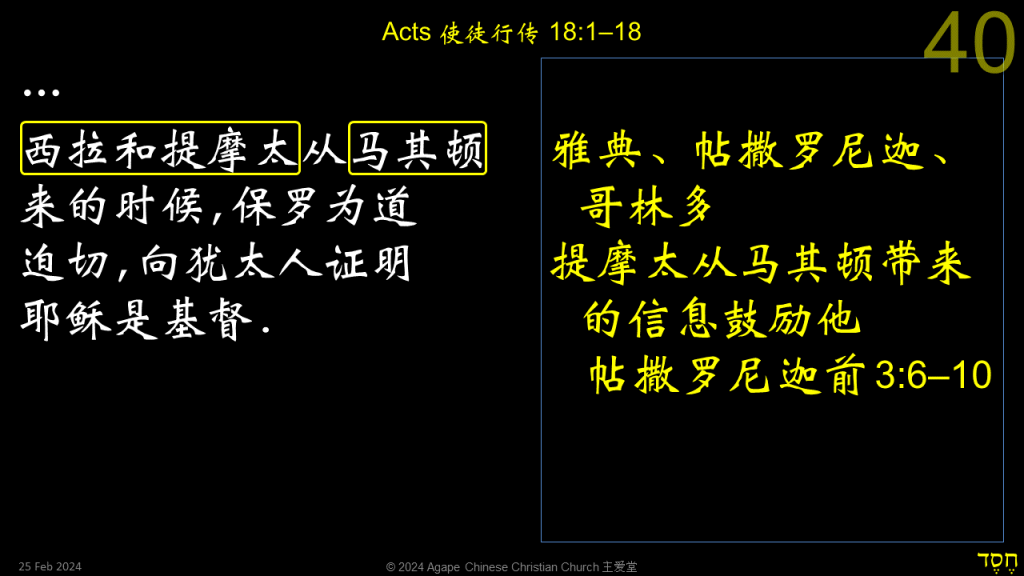
Timothy brought good news about the church in Thessalonica, giving Paul some encouragement.
So Paul is all the more eager to share the gospel with those in Corinth.
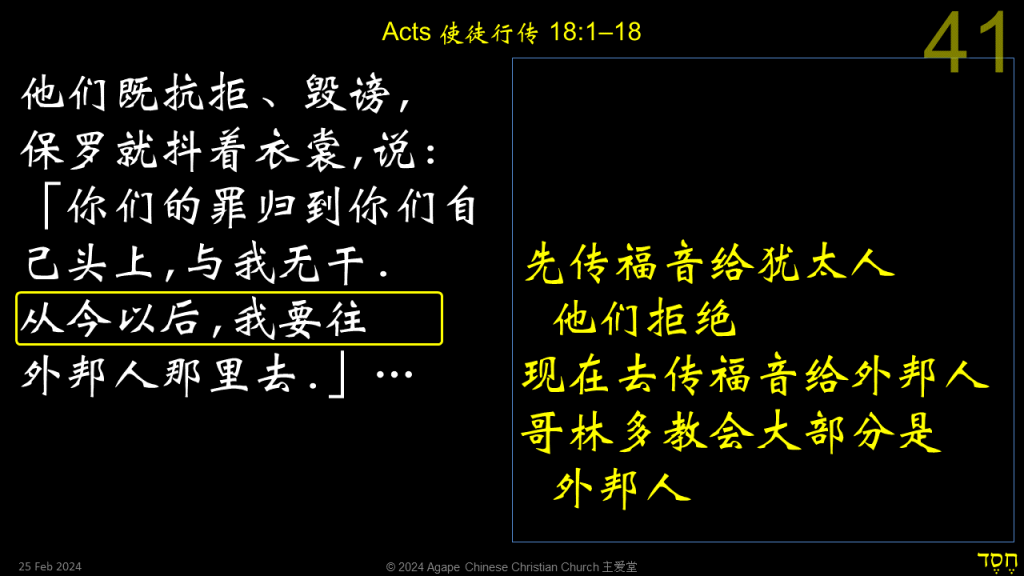
Paul always bring the gospel to the Jews first, only after to the Gentiles.
The Jews rejected the gospel, so the majority of the Corinthian church is Gentile.

This Titius Justus (Acts 18:7), do you think he’s a Jew or Gentile?
A Gentile for sure, because Luke said “who worshiped God.” A Jew is automatically someone who worships God, so having to specify this means Titius is Gentile.

Even Paul can be afraid when sharing the gospel.
This should give us encouragement!
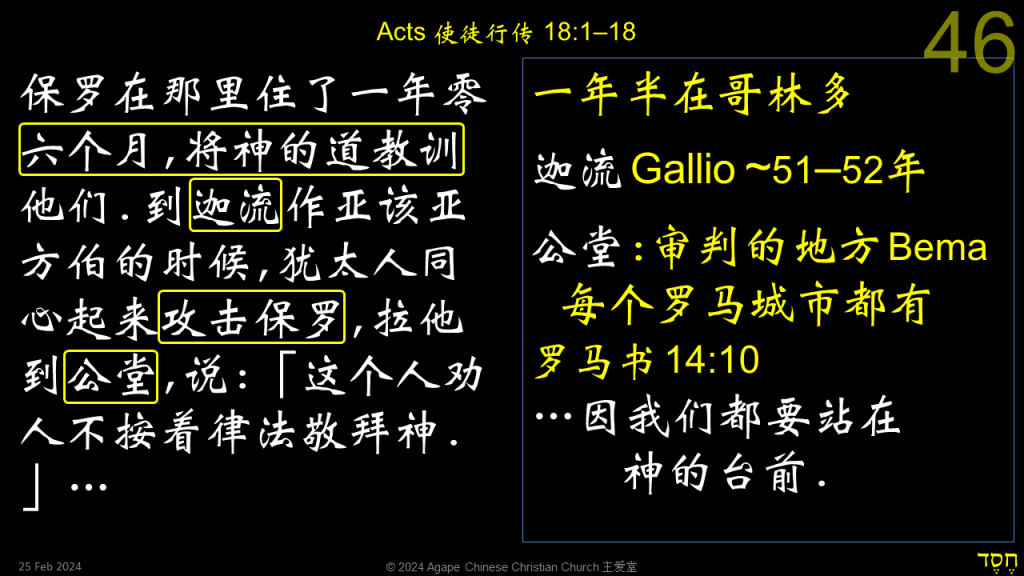
Gallio was proconsul of Archaia, the head Roman in the province.
His brother was Seneca, a very famous Roman philosopher.

Gallio didn’t want to bother with this Jewish dispute.
This is a bit like with Pilate.

Sosthenes was the new synagogue president, probably the replacement after they kicked out Crispus (the former president) because Crispus became a Christian.
Sosthenes appeared in 1 Cor 1:1 as a brother (in Christ) to Paul, but we can’t be sure if he’s the same person.
Section 2
We take a quick look at 2 churches founded by Paul.
Here is a table showing the places Paul visited during his 2nd missionary journey.
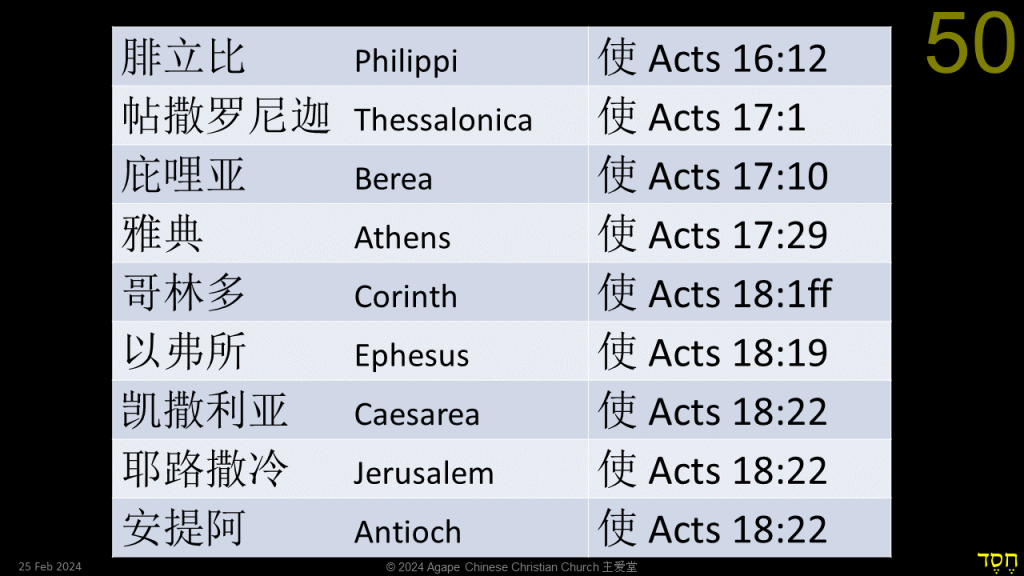

We want to compare Thessalonica and Corinth.
Both cities had churches established by Paul, and within at most a month or so of each other.
But there are vast differences between the 2 churches.
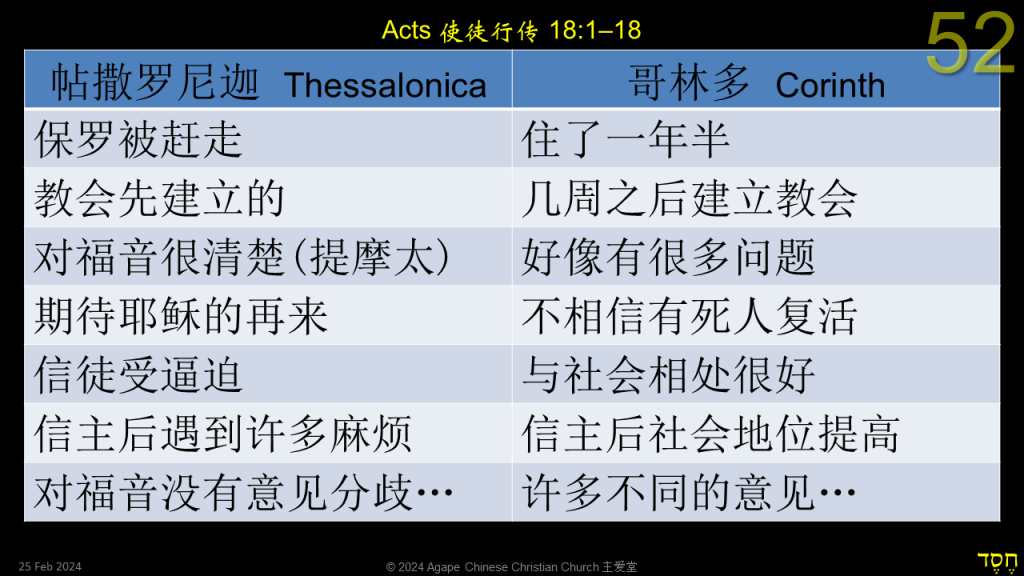
This table outlines some of the differences.
Paul was chased out of Thessalonica, but stayed in Corinth for a year and a half.
Both churches established by Paul, within at most weeks or a month of each other.
Thessalonians were very clear on the gospel, while the Corinthian churh had many problems.
Thessalonians were very eager and looking forward to Jesus’ return, while some Corinthians didn’t even believe in the resurrection.
Thessalonian believers were constantly persecuted for their belief, but Corinthian believers didn’t seem to have this problem.
Faith in Jesus brought Thessalonian believers lots of problems, but for the Corinthians, they seem to have raised their social status because of their faith.
Thessalonians didn’t have any disputes or disagreements on the gospel message, while the Corinthians had lots of different opinions and arguments.
Why such differences?
What do you think is (are) the reason(s)?
Most likely have to do with how well the Corinthian church integrates with the non-believing culture.
Thessalonian believers were very different from unbelievers, while Corinthian believers were pretty much indistinguishable from the greater Corinthian society and culture.
So What?

Lessons
- As Christians, how do we live in this world (culture) and still be faithful to God?
- How does our surrounding culture influence our faith, our worship, our service to the gospel?
- What are we bringing from our cultural background (including our previous beliefs or religions) into the church?
- When we become servants of the Lord, it’s not just adding “another aspect” or “another belief” into our lives; it’s an entirely new life, we have to be rid of the old one (dying to self). We have to evaluate all our old beliefs and habits, to see if they match what God wants of us (this, of course, assumes we know what God wants, which is why it’s so important to know the Bible).
